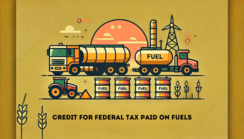Understanding the differences between excise tax and sales tax

Taxation is a complex and integral part of any economy, influencing consumer behavior, business operations, and government policies.
Among the various types of taxes, excise tax and sales tax stand out due to their specific applications and impact.
This article aims to elucidate the differences between these two taxes, providing clarity on when and how they are applied.
What is an excise tax?
Excise tax is a type of indirect tax imposed on specific goods, services, and activities.
It is typically levied on items such as tobacco, alcohol, fuel, and luxury goods, as well as activities like gambling and use of certain facilities.
Excise taxes can be both federal and state levies and are often included in the price of the product.
Purpose of excise tax
The primary purpose of excise taxes is to reduce the consumption of products that are considered harmful or to raise revenue for targeted funding projects.
For example, tobacco excise taxes are intended to discourage smoking by increasing the cost of cigarettes.
How is excise tax different from a sales tax?
Sales tax, on the other hand, is a broad-based tax imposed on retail sales of most goods and some services.
Sales tax is generally state-level tax and is visible to consumers at the point of sale as an additional charge on their purchases.
Key differences between excise tax and sales tax
| Aspect | Excise Tax | Seles Tax |
|---|---|---|
| Scope and Application | Applies to specific goods and activities. | Applies generally to all eligible goods and services purchased by consumers. |
| Taxation Method | Can be a fixed amount per unit (specific) or a percentage of the price (ad valorem). | Usually a percentage of the sale price charged at the point of sale. |
| Purpose | Often aimed at discouraging consumption of certain goods or funding specific government projects. | Primarily used to generate general revenue for state and local governments. |
| Visibility to Consumer | Often embedded in the price of the goods and not directly visible to consumers. | Explicitly displayed as a separate charge on receipts at the time of purchase. |
Examples of excise tax implementation
- Fuel taxes: Levied on gasoline purchases, used to fund transportation infrastructure.
- Tobacco taxes: Imposed to curb smoking rates and cover healthcare costs associated with tobacco use.
- Alcohol taxes: Targeted to reduce consumption and address public health issues.
Sales tax vs. excise tax: Economic implications
While both taxes affect consumer behavior and business pricing strategies, they do so in different ways.
Excise taxes, being product-specific, can significantly alter the competitive landscape for certain goods. For instance, higher tobacco taxes can lead to decreased cigarette sales and an increase in black market activities.
Sales taxes, affecting a broader range of products, do not typically aim to change consumer behavior but rather to collect revenue without targeting any specific sector.
However, they can disproportionately affect lower-income households, which spend a larger portion of their income on taxed goods.
Managing tax compliance for businesses
For businesses, understanding the distinctions between excise tax and sales tax is crucial for proper accounting and compliance.
Mismanagement of these taxes can lead to serious legal and financial consequences.
Compliance tips:
- Maintain accurate records of all transactions.
- Stay informed about tax rate changes and regulatory updates.
- Use automated tax software to ensure accurate calculation and remittance of taxes.
Conclusion
Excise tax and sales tax serve different purposes and impact consumers and businesses in unique ways.
By understanding these differences, individuals and businesses can better navigate the complexities of taxation and plan their finances accordingly.
For more detailed guidance, consulting with a tax professional is advisable, as they can provide tailored advice based on the latest tax regulations and changes.
Understanding the nuances between excise and sales tax not only helps in compliance but also in strategic financial planning, ultimately contributing to more informed consumer choices and business practices.
Disclaimer: This article is for informational purposes only and does not constitute legal or tax advice. Always consult with a tax professional regarding your specific case.

Ines Zemelman, EA, is the founder and president of TFX, specializing in US corporate, international, and expatriate taxation. With over 30 years of experience, she holds a degree in accounting and an MBA in taxation. See more
Further reading


